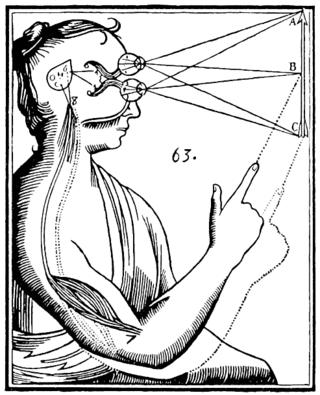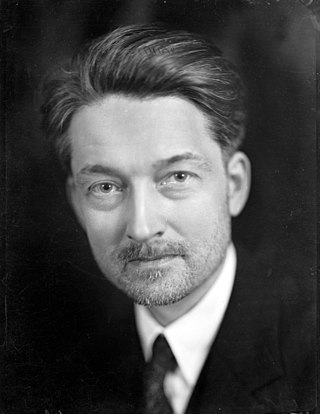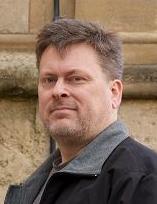Related Research Articles
In the philosophy of religion, a cosmological argument is an argument for the existence of God based upon observational and factual statements concerning the universe typically in the context of causation, change, contingency or finitude. In referring to reason and observation alone for its premises, and precluding revelation, this category of argument falls within the domain of natural theology. A cosmological argument can also sometimes be referred to as an argument from universal causation, an argument from first cause, the causal argument or the prime mover argument.

In the philosophy of mind, mind–body dualism denotes either the view that mental phenomena are non-physical, or that the mind and body are distinct and separable. Thus, it encompasses a set of views about the relationship between mind and matter, as well as between subject and object, and is contrasted with other positions, such as physicalism and enactivism, in the mind–body problem.

In classical theistic and monotheistic theology, the doctrine of divine simplicity says that God is simple . God exists as one unified entity, with no distinct attributes; God's existence is identical to God's essence.

Jacques Maritain was a French Catholic philosopher. Raised as a Protestant, he was agnostic before converting to Catholicism in 1906. An author of more than 60 books, he helped to revive Thomas Aquinas for modern times, and was influential in the development and drafting of the Universal Declaration of Human Rights. Pope Paul VI presented his "Message to Men of Thought and of Science" at the close of Vatican II to Maritain, his long-time friend and mentor. The same pope had seriously considered making him a lay cardinal, but Maritain rejected it. Maritain's interest and works spanned many aspects of philosophy, including aesthetics, political theory, philosophy of science, metaphysics, the nature of education, liturgy and ecclesiology.

Thomism is the philosophical and theological school which arose as a legacy of the work and thought of Thomas Aquinas (1225–1274), the Dominican philosopher, theologian, and Doctor of the Church.

Platonism is the philosophy of Plato and philosophical systems closely derived from it, though contemporary Platonists do not necessarily accept all doctrines of Plato. Platonism has had a profound effect on Western thought. At the most fundamental level, Platonism affirms the existence of abstract objects, which are asserted to exist in a third realm distinct from both the sensible external world and from the internal world of consciousness, and is the opposite of nominalism. This can apply to properties, types, propositions, meanings, numbers, sets, truth values, and so on. Philosophers who affirm the existence of abstract objects are sometimes called Platonists; those who deny their existence are sometimes called nominalists. The terms "Platonism" and "nominalism" also have established senses in the history of philosophy. They denote positions that have little to do with the modern notion of an abstract object.
David Braine was a British analytic philosopher with interests in analytic philosophy of religion and metaphysics, who sought to marry the techniques and insights of analytical philosophy and phenomenology to the metaphysics of classical Thomism.
Henry Babcock Veatch Jr. was an American philosopher.
Cornelio Fabro CSS was an Italian Catholic priest of the Stigmatine Order and a scholastic Thomist philosopher. He was the founder of the Institute for Higher Studies on Unbelief, Religion and Cultures.
Aeterni Patris was an encyclical issued by Pope Leo XIII in August 1879. It was subtitled "On the Restoration of Christian Philosophy in Catholic Schools in the Spirit of the Angelic Doctor, St. Thomas Aquinas". The aim of the encyclical was to advance the revival of Scholastic philosophy.

Philosophical anthropology, sometimes called anthropological philosophy, is a discipline dealing with questions of metaphysics and phenomenology of the human person.
John Francis Xavier Knasas is an American philosopher. He is a leading existential Thomist in the Neo-Thomist movement, best known for engaging such thinkers as Bernard Lonergan, Alasdair MacIntyre and Jeremy Wilkins in disputes over human cognition to affirm a Thomistic epistemology of direct realism and defending the thought of Jacques Maritain, Étienne Gilson and Fr. Joseph Owens. He holds the Bishop Wendelin J. Nold Endowed Chair as Professor of Philosophy at the Center for Thomistic Studies at the University of St. Thomas in Houston and earned his doctorate at the University of Toronto, under the direction of Fr. Joseph Owens.
Ontotheology means the ontology of God and/or the theology of being. While the term was first used by Immanuel Kant, it has only come into broader philosophical parlance with the significance it took for Martin Heidegger's later thought. While, for Heidegger, the term is used to critique the whole tradition of 'Western metaphysics', much recent scholarship has sought to question whether 'ontotheology' developed at a certain point in the metaphysical tradition, with many seeking to equate the development of 'ontotheological' thinking with the development of modernity, and Duns Scotus often being cited as the first 'ontotheologian'.

Neo-scholasticism is a revival and development of medieval scholasticism in Catholic theology and philosophy which began in the second half of the 19th century.
Joseph Owens was a Canadian Roman Catholic priest and a philosopher specializing in the thought of Aristotle, Thomas Aquinas, and medieval philosophy.
Western philosophy refers to the philosophical thought, traditions and works of the Western world. Historically, the term refers to the philosophical thinking of Western culture, beginning with the ancient Greek philosophy of the pre-Socratics. The word philosophy itself originated from the Ancient Greek philosophía (φιλοσοφία), literally, "the love of wisdom" Ancient Greek: φιλεῖν phileîn, "to love" and σοφία sophía, "wisdom".
John Russon is a Canadian philosopher, working primarily in the tradition of Continental Philosophy. In 2006, he was named Presidential Distinguished Professor at the University of Guelph, and in 2011 he was the Shastri Indo-Canadian Institute's Canadian Lecturer to India.

Edward Charles Feser is an American Catholic philosopher. He is an Associate Professor of Philosophy at Pasadena City College in Pasadena, California.

Stanislaw Ziemiański is a Jesuit philosopher and theologian, and a composer of numerous religious songs and hymns.
Quentin Lauer, S.J. was an American Jesuit priest, philosopher and Hegel scholar. Lauer’s academic work helped introduce Hegel's thought to the American philosophical community. He was President of the American Philosophical Association, Eastern Division from 1985–1986, and a President of the Hegel Society of America. Quentin Lauer was also a scholar of Edmund Husserl. He was a professor of philosophy at Fordham University from 1954 to 1990. Important works by Lauer which helped disseminate the ideas of Hegel and Husserl in the United States include: A Reading of Hegel's Phenomenology of Spirit (1977), The Triumph of Subjectivity (1958) and Edmund Husserl: Phenomenology and the Crisis of Philosophy (1965).
References
- ↑ "W. Norris Clarke".
- ↑ David Paternostro, S.J., "Getting Personal: The philosophy of W. Norris Clarke, S.J.", America, April 29, 2015
- ↑ "Clarke's Journey in His Own Words," AnthonyFlood.com
- ↑ Archived at Ghostarchive and the Wayback Machine : Live Reading #1 - Reason Fulfilled by Revelation: The 1930s Christian Philosophy Debates in France. YouTube .